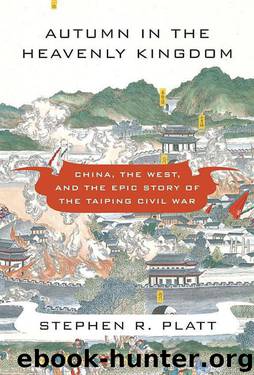Autumn in the Heavenly Kingdom: China, the West, and the Epic Story of the Taiping Civil War by Stephen R. Platt

Author:Stephen R. Platt [Platt, Stephen R.]
Language: eng
Format: epub, mobi
Tags: Non-Fiction, History, War, bought-and-paid-for
ISBN: 9780307271730
Publisher: Knopf
Published: 2012-02-01T05:00:00+00:00
The five-year-old heir to the Qing imperial throne was the son of one of Xianfeng’s concubines, a pretty young Manchu woman named Yehonala who had been chosen by Xianfeng to be his consort when she was just fifteen. At twenty she had borne him a son, and by chance that boy was one of only two of Xianfeng’s children to survive longer than a day (the other, a girl, was ineligible to rule).30 When the boy became heir apparent, the young Yehonala’s status at court rose from third-tier imperial consort to mother of the reigning emperor, a rank to compare with that of the late emperor’s wife, and she would thereafter be known in China and abroad by her title in that capacity: the Empress Dowager Cixi.31 Along with Queen Victoria, the empress dowager would in time become one of the two most powerful women in the nineteenth-century world; but at the moment, her position as mother of the new emperor was still mainly one of prestige.
As for the real transmission of power, just before Xianfeng died he issued an edict naming his eight closest Manchu advisers—Sushun, Zaiyuan, Muyin, Duanhua, and four others—to be the regents for his heir. Traditionally, when a new emperor was too young to rule, power was entrusted to one or more regents, usually brothers or cousins of the previous emperor, who would govern on the youthful sovereign’s behalf until he reached the age of majority. Such had been the case with two young emperors early in the dynasty, though the experience of those years had taught that regents were not, generally speaking, eager to give up power when the time came. Dark struggles had followed the coming of age of those early emperors. But thanks to the remarkably young age of Xianfeng’s successor, Sushun and the other new regents could look forward to ruling the empire for at least a decade before the boy might challenge them.
These were the same advisers who had traveled with the emperor into exile, the same Manchu war hawks who so deeply resented the presence of Europeans in the empire. They dreamed of abrogating the new treaties and were suspicious of Prince Gong’s apparent softness toward the foreigners. With their ascent to power, his plan for the new Office of Foreign Affairs—namely, to do everything possible to appease the Europeans while focusing the dynasty’s remaining strength on fighting the Taiping—was thrown into question. For Zeng Guofan, however, their assumption of the reins of government bode very well, since his chief patron in the imperial court, Sushun, was the new regency’s primus inter pares. In fact, the very edict of transition naming the imperial heir had been written in Sushun’s hand; the Xianfeng emperor had been so weak on his deathbed (or so said the official records) that he’d been unable to write the edict himself and had instead dictated it to his most trusted adviser.32
The only check to the power of the new regents was the pair of empresses dowager: Yehonala and Xianfeng’s widow.
Download
Autumn in the Heavenly Kingdom: China, the West, and the Epic Story of the Taiping Civil War by Stephen R. Platt.mobi
This site does not store any files on its server. We only index and link to content provided by other sites. Please contact the content providers to delete copyright contents if any and email us, we'll remove relevant links or contents immediately.
| Central Asia | Southeast Asia |
| China | Hong Kong |
| India | Japan |
| Korea | Pakistan |
| Philippines | Russia |
The Rape of Nanking by Iris Chang(3531)
The Sympathizer by Viet Thanh Nguyen(3528)
World without end by Ken Follett(3016)
Ants Among Elephants by Sujatha Gidla(2932)
Blood and Sand by Alex Von Tunzelmann(2615)
Japanese Design by Patricia J. Graham(2567)
City of Djinns: a year in Delhi by William Dalrymple(2140)
Inglorious Empire by Shashi Tharoor(2108)
In Order to Live: A North Korean Girl's Journey to Freedom by Yeonmi Park(2064)
Foreign Devils on the Silk Road: The Search for the Lost Treasures of Central Asia by Peter Hopkirk(2061)
Tokyo by Rob Goss(2025)
India's Ancient Past by R.S. Sharma(1994)
India's biggest cover-up by Dhar Anuj(1992)
The Great Game: On Secret Service in High Asia by Peter Hopkirk(1965)
Tokyo Geek's Guide: Manga, Anime, Gaming, Cosplay, Toys, Idols & More - The Ultimate Guide to Japan's Otaku Culture by Simone Gianni(1953)
Goodbye Madame Butterfly(1942)
The Queen of Nothing by Holly Black(1770)
Living Silence in Burma by Christina Fink(1738)
Batik by Rudolf Smend(1726)
